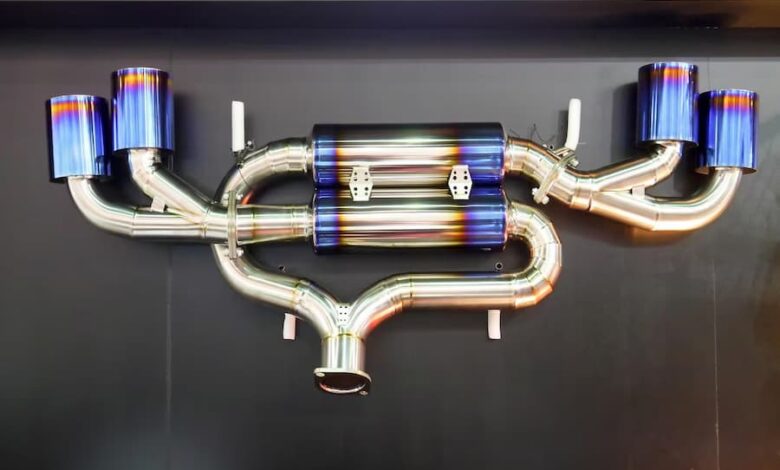Stainless Steel vs Aluminum Exhaust: Which is Better?

The exhaust system of any vehicle is quite interesting, for it can be very silent or let out a deafening sound, depending on the driver’s taste for a sporty sound. Whether one’s car has a near-silent stainless steel exhaust or an alternative constructed from lightweight aluminium, this topic is a continuous argument. Stainless steel is mainly known for having the greatest corrosion resistance, being very tough, and having very high tensile strength, hence being extremely durable.
Aluminium exhausts are way lighter, which improves fuel economy by saving on much-added weight. But again, this advantage comes at the expense of durability since aluminium wears out quickly over time. In the end, it all depends on what one wants. A stainless steel exhaust is better for those requiring longevity and reliability, while an aluminium pipe should suit performance enthusiasts much more. Every material has its positive side, but each application serves another need.
Durability:
However, for durability, the gap is highly in favour of stainless steel. Characterised by corrosion and tensile strength, stainless steel exhaust systems do not rust even in bad weather conditions or when exposed to salty roads. For these reasons, stainless steel turns out to be the best choice for every driver who is looking for some reliable means with less maintenance. Whereas Aluminum is resistant to rust, it generally has lesser durability and is prone to dents and damages, particularly in the most unfavourable ecosystems.
Weight:
Aluminium exhaust systems are much lighter compared to their stainless steel counterparts. Weight reduction can lend better performance to the vehicle by improving fuel economy and putting less strain on the engine. For owners of performance-oriented cars, aluminium is the go-to because of its lightweight nature. However, this advantage comes with a trade-off: being less dense, aluminium is less robust than stainless steel, which limits its lifespan in heavy-duty applications.
Heat Resistance:
Exhaust systems are required to bear extreme temperatures, a factor where stainless steel thrives. It maintains its structural strength and appearance even under prolonged exposure to high heat, which is common in high-performance or long-distance driving. For instance, aluminium, while dissipating heat quite fast, does not possess the strength to resist warping or weakening when subjected to the same conditions. The resistance to heat of stainless steel means constant performance over time.
Cost Considerations:
Aluminum Is Inexpensive To bargain seekers, aluminium exhaust systems are usually cheaper at the point of purchase than stainless steel varieties. It is this aspect of affordability that makes it a practical choice for many looking to upgrade or replace exhaust systems on a budget. With lessened durability, though, long-term costs may outweigh initial savings; the need for repairs and/or replacement of aluminium-based exhausts is greater due to this fact. In contrast, a stainless steel exhaust may be higher in price but gives more value in terms of longevity and reliability.
Aesthetics:
Stainless steel exhausts are popular not just for their performance but also for their polished, sleek appearance. The shiny finish of stainless steel adds a premium look to vehicles, appealing to car enthusiasts who prioritise aesthetics. Over time, stainless steel retains its lustre and resists tarnish and corrosion. Aluminium, on the other hand, gets the job done but doesn’t have the same aesthetic appeal. It may also dull and wear down over time. For those who want an exhaust system that looks every bit as good as it performs, stainless steel is the way to go.
Application-Specific Benefits:
Decisions between using stainless steel or aluminium would mostly depend on where the use is directed. If what one needs is for high performance in a car or mostly being exposed to a very harsh environment, then stainless steel will be perfect because of its durability and temperature resistance; however, for lighter cars where minimum gross weight must be realised, then an aluminium-based exhaust would work better. For example, aluminium is perfect for sports cars or racing vehicles where weight savings are crucial, while trucks, SUVs, and daily drivers are better off with the robustness of a stainless steel exhaust. Know your specific needs, and that will point you toward the right material to use.
Conclusion:
The debate between stainless steel and aluminium exhaust systems is on several points: durability, weight, heat resistance, cost, and appearance. While stainless steel is better in strength, longevity, and good looks, hence more common for drivers, the lightweight and cheap solution that aluminium provides caters to certain needs of performance or financials. Eventually, it is a matter of personal priorities. If a person wants durability and attractiveness, he should choose a stainless steel exhaust. If a person wants to reduce weight and save some money, then aluminium can be the right material. Your well-considered estimate of your car needs and driving style will assist in selecting the right model that fully meets your expectations.
Visit Paid Services for more informative blogs.




